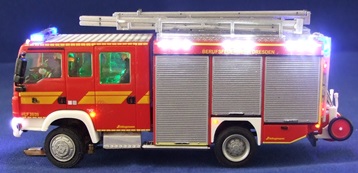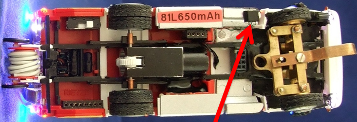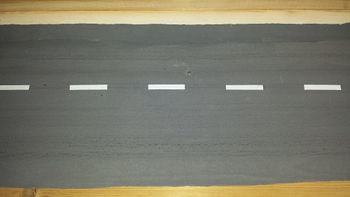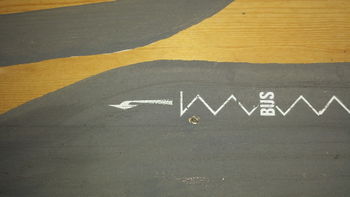Difference between revisions of "Fire engines automatic"
m (→wichtige CV´s für die Nutzung der Feuerwehrautomatik) |
m |
||
| (13 intermediate revisions by 2 users not shown) | |||
| Line 32: | Line 32: | ||
'''There are three types of operation:''' | '''There are three types of operation:''' | ||
| − | == 1.) Simple fire engine (CV111 = 0) == | + | == 1.) Simple fire engine ([[CV111]] = 0) == |
<br> | <br> | ||
If the emergency vehicle drives over the first magnet, the blue lights and the front flashers are activated. <br> | If the emergency vehicle drives over the first magnet, the blue lights and the front flashers are activated. <br> | ||
| Line 42: | Line 42: | ||
<br> | <br> | ||
| − | == 2.) Extended fire engine (CV111 = 1 or 123) == | + | == 2.) Extended fire engine ([[CV111]] = 1 or 123) == |
<br> | <br> | ||
The extended fire engine simulates a real fire brigade. Once the emergency vehicle has passed the first magnet, <br> | The extended fire engine simulates a real fire brigade. Once the emergency vehicle has passed the first magnet, <br> | ||
| Line 56: | Line 56: | ||
<br> | <br> | ||
| − | === A distinction is made between two types of | + | === A distinction is made between two types of operation: === |
<br> | <br> | ||
| − | 1.) In this case | + | 1.) In this case it is possible that the normal traffic passes the fire brigade at the place of the fire. If this is the case, CV100 must be set to 10. <br> |
| − | This value specifies that the distance control is switched off during the stay at the job site. It also activates the | + | This value specifies that the distance control is switched off during the stay at the job site. It also activates the convoy function. <br> |
<br> | <br> | ||
| − | 2.) All vehicles are stopped behind the emergency vehicle as long as the emergency vehicle is at the place of | + | 2.) All vehicles are stopped behind the emergency vehicle as long as the emergency vehicle is at the place of the fire. In this case, the CV100 must be set to the value 11. <br> |
<br> | <br> | ||
| − | [https://www.youtube.com/watch?v=_0MiZEZv7sU Video: | + | [https://www.youtube.com/watch?v=_0MiZEZv7sU Video: Extended fire engine]<br> |
<br> | <br> | ||
| Line 88: | Line 88: | ||
== important CV's for the use of the fire engine == | == important CV's for the use of the fire engine == | ||
<br> | <br> | ||
| − | '''CV100''' = Defines the type of vehicle and defines the type of work site or whether the distance control is switched on or off during the stay at the work site <br> | + | '''[[CV100]]''' = Defines the type of vehicle and defines the type of work site or whether the distance control is switched on or off during the stay at the work site <br> |
'' Value 10 '' Distance control with stop OFF, activation of the delete pull function <br> | '' Value 10 '' Distance control with stop OFF, activation of the delete pull function <br> | ||
'' Value 11 '' Distance control with stop ON <br> | '' Value 11 '' Distance control with stop ON <br> | ||
<br> | <br> | ||
| − | '''CV101''' = flashing time for function | + | '''[[CV101]]''' = flashing time for function module E7 <br> |
| − | '''CV102''' = Drive to be braked for function | + | '''[[CV102]]''' = Drive to be braked for function module E7 <br> |
| − | '''CV103''' = time in seconds that an emergency vehicle waits at a stop when it receives a stop command from function | + | '''[[CV103]]''' = time in seconds that an emergency vehicle waits at a stop when it receives a stop command from function module E2 to E5 or after recognizing the 2nd magnet |
If this value is 0, the automatic departure will not be initiated. <br> | If this value is 0, the automatic departure will not be initiated. <br> | ||
| − | '''CV104''' = flashing time for the left turn signal. Valid for function | + | '''[[CV104]]''' = flashing time for the left turn signal. Valid for function module E6 or automatic for bus and emergency vehicle. The time determines how long a vehicle will blink on the left before it starts. <br> |
| − | If the vehicle has the genus 10 or 14, the distance control is reactivated | + | If the vehicle has the genus 10 or 14, the distance control is reactivated when switching on the turn signal. The following traffic will be stopped, <br> |
so that the vehicle can thread itself into the flowing traffic again after the passage of time. The time should be such that the traffic is definitely on the stationary vehicle | so that the vehicle can thread itself into the flowing traffic again after the passage of time. The time should be such that the traffic is definitely on the stationary vehicle | ||
has passed before it starts again. <br> | has passed before it starts again. <br> | ||
| − | '''CV105''' = Driving position with which an emergency vehicle leaves the site. Valid for function module E or automatic for bus and emergency vehicle <br> | + | '''[[CV105]]''' = Driving position with which an emergency vehicle leaves the site. Valid for function module E or automatic for bus and emergency vehicle <br> |
| − | '''CV106''' = Blinking time for the left turn signal after the exit. Valid for function module E or automatic for bus and emergency vehicle. Definitely the time, <br> | + | '''[[CV106]]''' = Blinking time for the left turn signal after the exit. Valid for function module E or automatic for bus and emergency vehicle. Definitely the time, <br> |
how long the left turn signal remains on after the vehicle has left the job site <br> <br> | how long the left turn signal remains on after the vehicle has left the job site <br> <br> | ||
| − | '''CV107''' = time in which no renewed stop command is accepted during an automatically initiated shutdown command. Valid for function module E. <br> | + | '''[[CV107]]''' = time in which no renewed stop command is accepted during an automatically initiated shutdown command. Valid for function module E. <br> |
This time window prevents the halting of the vehicle by the halt command of the function module. <br> | This time window prevents the halting of the vehicle by the halt command of the function module. <br> | ||
| − | '''CV108''' = Hold time for function | + | '''[[CV108]]''' = Hold time for function module D1 - D4 <br> |
'' Value 0 '' = lasts until a start or stop command is received <br> | '' Value 0 '' = lasts until a start or stop command is received <br> | ||
'' Value 1-63 '' = holds 1-63 seconds <br> | '' Value 1-63 '' = holds 1-63 seconds <br> | ||
| − | '''CV111''' = Activates the fire engine <br> | + | '''[[CV111]]''' = Activates the fire engine <br> |
'' Value 0 '' = simple fire-engine automatic active <br> | '' Value 0 '' = simple fire-engine automatic active <br> | ||
'' Value 1 '' = advanced fire engine active <br> | '' Value 1 '' = advanced fire engine active <br> | ||
'' Value 123 '' = advanced fire truck office active, after reaching the 2nd magnet, light 2 will be switched on for the duration of your stay | '' Value 123 '' = advanced fire truck office active, after reaching the 2nd magnet, light 2 will be switched on for the duration of your stay | ||
| − | '''CV112''' = Definition of the functions during the stop <br> | + | '''[[CV112]]''' = Definition of the functions during the stop <br> |
'' Value 1 '' = Left turn signal <br> | '' Value 1 '' = Left turn signal <br> | ||
'' Value 2 '' = Right turn signal <br> | '' Value 2 '' = Right turn signal <br> | ||
| Line 123: | Line 123: | ||
'' Value 128 '' = driving light <br> | '' Value 128 '' = driving light <br> | ||
| − | = | + | = Order the DC-Car with setting = |
| − | + | If you do not have your own setting option (digital control unit or CV-Programmer), you can also order the settings. <br> | |
| − | + | Specify when ordering <br> | |
| − | + | Bus automatic: <br> | |
| − | < | + | <Table> |
| − | <tr><td> | + | <tr><td> Deployment of the road </td><td> O </td><td> IR-OFF </td><td> CV100 = 14 </td></tr> |
| − | <tr><td> | + | <tr><td> Deployment on the road </td><td> O </td><td> IR-ON </td><td> CV100 = 15 </td></tr> |
| − | </ | + | </Table> |
<br> | <br> | ||
| − | + | Standstill: <br> | |
| − | < | + | <Table> |
| − | <tr><td> | + | <tr><td> with interior light / working light = light2 </td><td> O </td><td> CV111 = 123 </td></tr> |
| − | <tr><td> | + | <tr><td> without interior light / working light = light2 </td><td> O </td><td> CV111 = 1 </td></tr> |
| − | <tr><td> | + | <tr><td> with hazard warning </td><td> O </td><td> CV112 = 3 </td></tr> |
| − | <tr><td> | + | <tr><td> without hazard warning </td><td> O </td><td> CV112 = 0 </td></tr> |
| − | <tr><td> | + | <tr><td> waiting time </td><td> O </td><td> CV103 Specify (0-63 seconds) </td></tr> |
| − | </ | + | </Table> |
| + | [[Category:CVlist]] | ||
[[Category:Software]] | [[Category:Software]] | ||
[[Category:Function_moduls,_Function_decoders]] | [[Category:Function_moduls,_Function_decoders]] | ||
[[Category:Decoder]] | [[Category:Decoder]] | ||
[[Category:Request moduls]] | [[Category:Request moduls]] | ||
| − | |||
[[Category:DC-Car-System]] | [[Category:DC-Car-System]] | ||
[[Category:Automatics]] | [[Category:Automatics]] | ||
[[Category:Fire engine automatics]] | [[Category:Fire engine automatics]] | ||
| − | [[Category: | + | [[Category:Index_US]] |
| + | [[Category:Index_UK]] | ||
Latest revision as of 15:32, 14 January 2018
Fire engine automatic
Each DC car decoder has a built-in fire engine automatic. This is similar to the Busautomatic, but has a very different job and the functions are different too.
It is thus possible to run real firefighting operations completely automatically, or to switch the special signal system of an emergency vehicle on and off without additional controls.
With CV100 and CV111 this fire engine is activated.
Of course, all other types of emergency vehicles (police, ambulance, etc.) can be equipped with it.
What do you need for this?
1x emergency vehicle with DC car decoder
1x Hall sensor on the vehicle floor
Two magnets in the roadway
one at the place where the mission should begin (e.g., fire station)
one at the job site (where the emergency vehicle should stop)
There are three types of operation:
1.) Simple fire engine (CV111 = 0)
If the emergency vehicle drives over the first magnet, the blue lights and the front flashers are activated.
If you have a DC car sound module connected, this will be activated too.
When driving over the second magnet blue light, front (sound) are switched off again.
video: simple fire engine procedure
2.) Extended fire engine (CV111 = 1 or 123)
The extended fire engine simulates a real fire brigade. Once the emergency vehicle has passed the first magnet,
Turns on blue lights, front flashers (sound) and drives with drive level 28 to the site.
Once it has reached the place of use (2nd magnet in the road), it stops and switches off the front sound (sound).
In addition, when CV111 is set to 123, light 2 and the light outputs defined in CV112 will be turned on.
The "duration of use" is factory set to 20 seconds and can be changed with CV103.
At the end of this time, the functions of CV 111 / CV112 and the blue lights will be switched off and the left turn signal and the distance control activated.
The emergency vehicle waits a moment to let a passing vehicle pass and then gets into traffic.
Afterwards it switches off the turn signal on the left again. The distance control stops the following vehicles and prevents a collision when placing them in current traffic.
A distinction is made between two types of operation:
1.) In this case it is possible that the normal traffic passes the fire brigade at the place of the fire. If this is the case, CV100 must be set to 10.
This value specifies that the distance control is switched off during the stay at the job site. It also activates the convoy function.
2.) All vehicles are stopped behind the emergency vehicle as long as the emergency vehicle is at the place of the fire. In this case, the CV100 must be set to the value 11.
Video: Extended fire engine
3.) Convoy function (DC07 / DC08 as of firmware 10/2014)
Inserts that require more than one vehicle are with the extended fire engine only very cumbersome and absolutely not exemplary feasible.
Each vehicle that passed the first magnet has to travel over the second magnet to perform the appropriate functions at the job site.
It looks very strange, when each vehicle arrives individually and leaves. Therefore, a new function is now built into the DC-07 / DC08 decoder which allows you to
that any number of vehicles move out to a job site, arrive together and drive back to the station together.
For this, each vehicle in CV100 must have the genus 10 and in CV111 the value 1 or 123.
The vehicle, which after passing over the first magnet (start of the fire engine), passes over the second magnet (place of application),
automatically sends a signal to the following emergency vehicle, whereupon it stops and performs the same functions as if it had just driven over the second magnet.
Each subsequent vehicle with o.g. setting executes the corresponding functions.
After the set time (i.d.R., 20sec.) The vehicles will drive back to their starting point at moderate speed and without any special signal.
All vehicles that have not yet driven over the second magnet must now drive over it.
The magnet is ignored so as not to trigger the fire engine again. Only with the next magnet does the fire engine start again.
Video: convoy function
important CV's for the use of the fire engine
CV100 = Defines the type of vehicle and defines the type of work site or whether the distance control is switched on or off during the stay at the work site
Value 10 Distance control with stop OFF, activation of the delete pull function
Value 11 Distance control with stop ON
CV101 = flashing time for function module E7
CV102 = Drive to be braked for function module E7
CV103 = time in seconds that an emergency vehicle waits at a stop when it receives a stop command from function module E2 to E5 or after recognizing the 2nd magnet
If this value is 0, the automatic departure will not be initiated.
CV104 = flashing time for the left turn signal. Valid for function module E6 or automatic for bus and emergency vehicle. The time determines how long a vehicle will blink on the left before it starts.
If the vehicle has the genus 10 or 14, the distance control is reactivated when switching on the turn signal. The following traffic will be stopped,
so that the vehicle can thread itself into the flowing traffic again after the passage of time. The time should be such that the traffic is definitely on the stationary vehicle
has passed before it starts again.
CV105 = Driving position with which an emergency vehicle leaves the site. Valid for function module E or automatic for bus and emergency vehicle
CV106 = Blinking time for the left turn signal after the exit. Valid for function module E or automatic for bus and emergency vehicle. Definitely the time,
how long the left turn signal remains on after the vehicle has left the job site
CV107 = time in which no renewed stop command is accepted during an automatically initiated shutdown command. Valid for function module E.
This time window prevents the halting of the vehicle by the halt command of the function module.
CV108 = Hold time for function module D1 - D4
Value 0 = lasts until a start or stop command is received
Value 1-63 = holds 1-63 seconds
CV111 = Activates the fire engine
Value 0 = simple fire-engine automatic active
Value 1 = advanced fire engine active
Value 123 = advanced fire truck office active, after reaching the 2nd magnet, light 2 will be switched on for the duration of your stay
CV112 = Definition of the functions during the stop
Value 1 = Left turn signal
Value 2 = Right turn signal
Value 3 = hazard warning lights
Value 4 = light 2
Value 5 = light 3 (depending on CV20)
Value 16 = light 4 (depending on CV20)
Value 32 = blue lights
Value 64 = Front flashers
Value 128 = driving light
Order the DC-Car with setting
If you do not have your own setting option (digital control unit or CV-Programmer), you can also order the settings.
Specify when ordering
Bus automatic:
| Deployment of the road | O | IR-OFF | CV100 = 14 |
| Deployment on the road | O | IR-ON | CV100 = 15 |
Standstill:
| with interior light / working light = light2 | O | CV111 = 123 |
| without interior light / working light = light2 | O | CV111 = 1 |
| with hazard warning | O | CV112 = 3 |
| without hazard warning | O | CV112 = 0 |
| waiting time | O | CV103 Specify (0-63 seconds) |



